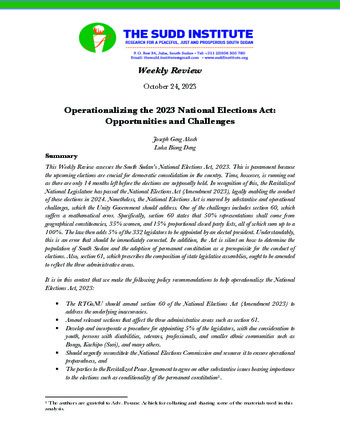Operationalizing the 2023 National Elections Act: Opportunities and Challenges
Publication Summary
This Weekly Review assesses the South Sudan’s National Elections Act, 2023. This is paramount because the upcoming elections are crucial for democratic consolidation in the country. Time, however, is running out as there are only 14 months left before the elections are supposedly held. In recognition of this, the Revitalized National Legislature has passed the National Elections Act (Amendment 2023), legally enabling the conduct of these elections in 2024. Nonetheless, the National Elections Act is marred by substantive and operational challenges, which the Unity Government should address. One of the challenges includes section 60, which suffers a mathematical error. Specifically, section 60 states that 50% representations shall come from geographical constituencies, 35% women, and 15% proportional closed party lists, all of which sum up to a 100%. The law then adds 5% of the 332 legislators to be appointed by an elected president. Understandably, this is an error that should be immediately corrected. In addition, the Act is silent on how to determine the population of South Sudan and the adoption of permanent constitution as a prerequisite for the conduct of elections. Also, section 61, which prescribes the composition of state legislative assemblies, ought to be amended to reflect the three administrative areas.
It is in this context that we make the following policy recommendations to help operationalize the National Elections Act, 2023:
- The RTGoNU should amend section 60 of the National Elections Act (Amendment 2023) to address the underlying inaccuracies.
- Amend relevant sections that affect the three administrative areas such as section 61.
- Develop and incorporate a procedure for appointing 5% of the legislators, with due consideration to youth, persons with disabilities, veterans, professionals, and smaller ethnic communities such as Bongo, Kachipo (Suri), and many others.
- Should urgently reconstitute the National Elections Commission and resource it to ensure operational preparedness, and
- The parties to the Revitalized Peace Agreement to agree on other substantive issues bearing importance to the elections such as conditionality of the permanent constitution.
Joseph Geng Akech is an Adjunct Assistant Professor of Law at the University of Juba. He holds a Doctor of Laws (LLD) in constitutional law, and he has published widely in constitutional designs, human rights, and transitional justice. He may be reached on e-mail: josephgakech@gmail.com.
Luka Biong Deng Kuol's Biography
Luka Biong Deng is a Senior Research Fellow and Consultant at the Sudd Institute, an Adjunct Professor of Peace, Development, and Security Studies at the University of Juba, and an Adjunct Distinguished Professor of African Security Studies at the Africa Center for Strategic Studies (ACSS), National Defense University, USA. He served in various capacities in the governments of Sudan and South Sudan, with think-tanks around the world and a member of various global expert groups including Integrated Food Security Phase Classification (IPC) Famine Review Committee and the Overseas Development Institute (ODI) Global Advisory Panel on the Future of Human Action. Dr. Deng holds a Ph.D. in Development Studies Policy from the Institute of Development Studies (IDS), University of Sussex, UK.

